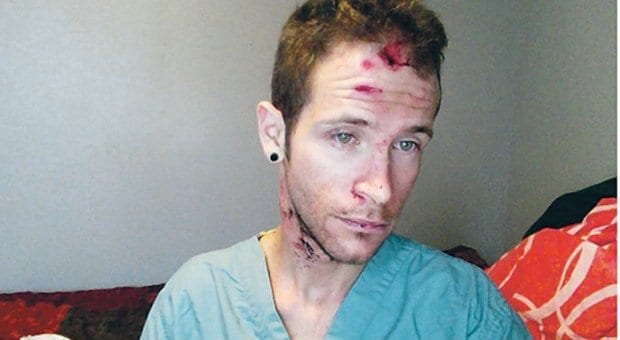Pattrick Blackburn probably played me.
I wrote about Blackburn in August, when I was sent links to his Facebook page. On it he’d posted pictures of himself covered in blood and bandages, allegedly from a vicious gaybashing he received at the hands of three men as he walked home in St John’s, Newfoundland. He broke down in tears on YouTube as he thanked everyone for their support. By email, he recounted the assault and told me that he filed a police report at the hospital.
But this story wasn’t quite so clear cut.
Blackburn said on camera that he was just minutes away from death when a friend found him lying in some bushes. That friend, though, apparently took the time to snap two cellphone pictures of a bloody — but not that bloody — Blackburn, seemingly semi-conscious.
And if he was that close to death, what was he doing out of hospital just five days later? What kind of hospital sends a patient home with only over-the-counter Band-Aids — which Blackburn is sporting in the pictures — to cover a wound that serious? What’s he doing wearing hospital scrubs at home?
There were questions.
Breaking the story
Initially, I took the story at face value. I called the St John’s police, who said they were looking into it. I contacted Blackburn, who sent a few brief emails and promised to reach me by phone, before he stopped returning my email questions. I followed up with the friend who supposedly found, and saved, Blackburn and got no answer. I decided to sit on the story and wait for more evidence before I published.
Tara Bradbury is a reporter with the St John’s Telegram. She began following the story roughly when I did and had the same trepidation about going to print.
“We were unsatisfied with the facts,” Bradbury told me over the phone.
“We got a lot of criticism for it — people saying that we don’t care about hate crimes.”
Barb Sweet, a reporter with the Telegram who is openly gay, wrote a column to assuage criticisms that she had not done enough to report on the story. “Before we get too caught up in the fury, remember every allegation is due a level of scrutiny and questions must be answered,” she wrote.
Sweet faced many of the criticisms on Facebook, from those who had seen the images of Blackburn’s supposed injuries.
The social nature of the story made it nearly impossible not to publish. A few hours after I decided to hold my story, the social curator at canada.com, followed quickly by The Huffington Post, collected the postings and the social media reaction and published the story on their respective sites.
In the coming days, it became increasingly obvious that my initial suspicions were right. Holes in Blackburn’s story were emerging — in one interview he said he was found lying in some bushes. In another, he says he was picked up while wandering around.
The police flatly denied that any report was filed.
“The [Royal Newfoundland Constabulary] has been in contact with the individual and provided opportunities to make a formal complaint,” reads a release from the St John’s police.
Speaking to QMI, Blackburn said that he was facing bullying and harassment because of the story. He said that he wasn’t filing a complaint because he doesn’t remember his attackers.
Ishmael Daro is the trends editor at canada.com, where he broke the Blackburn story. He points to shrinking newsrooms as a main reason the story made it online, seemingly, without enough scrutiny. Xtra published its story not long after canada.com.
What’s more, Daro told me by email, “this story clearly played on a lot of journalists’ innate revulsion at any instances of gaybashing, so maybe lesser standards of evidence were followed than would be wise.”
After questions began to swirl and the media analyzed some of the inconsistencies, much of the evidence was deleted from Blackburn’s Facebook and YouTube, leaving virtually no suggestion that he had almost been beaten to death.
On Sept 8, a friend commented on one of his photos to congratulate him on getting certified as a fitness instructor.
So did he lie?
There’s no way to be sure.
The community reaction
But even amidst the uncertainty, funds were raised in support of Blackburn.
Two organizers of fundraisers for Blackburn, one in St John’s and the other in Ottawa, refused to speak to Xtra about this story.
When I emailed Ottawa organizer Elliott Youden, who is a former board member of Capital Pride and is originally from Newfoundland, he refused to speak to me unless I submitted a list of questions via email — something no reasonable journalist does in such a situation. I declined. He refused to speak with me.
The organizer from St John’s, a close friend of Blackburn’s, wouldn’t speak with me by phone but did say that two reports were made to the police — one by the friend who found Blackburn and a second by Blackburn himself, over the phone. They said that Blackburn felt mistreated by the police and did not continue with the process.
A concerned citizen organized a second fundraiser and put together an album of local music to raise money for Blackburn, whom he’d never met, with all proceeds going through the donation link on a website set up after the alleged assault. After that website was taken down, proceeds went to the city’s Pride parade.
“He was a bit hurt,” Bradbury says. “He felt that he was getting persecuted for believing him.
“This whole thing has really divided the whole LGBT community.”
Initially, on social media, there was some blame placed on St John’s for the attack. Bradbury says that criticism is unfair. “This city is very open.” (I grew up a ferry ride away from Newfoundland and echo that sentiment.)
Brian Hodder, past chairman for Newfoundland Gays and Lesbians for Equality, took to the Telegram last week to write that when the story first came out, “I also felt a tingle of fear, wondering just how safe this city that I love truly is.”
Bradbury says that if this is a case of the boy who cried wolf, there are real ramifications for the city. “If it’s not true, he instilled fear into the whole community, and he’s got to make it right,” she says.
False reporting
As evidenced by a growing number of “men’s rights” groups popping up across North America, there is a fairly prevalent misconception that false reporting — be it for rape, assault or any other crime — is common.
Bradbury, in her 11 years of experience, can think of maybe two similar cases in which the supposed victim put forward a story that was categorically untrue.
In my experience with Xtra, I can think of a handful of stories where I was informed, either by readers or sources, that there were inconsistencies in the story I was writing. But I cannot think of one where my original source was lying outright.
Deciding that a source might be lying is not an easy judgment call to make.
In Bradbury’s case, she went through pains to ensure that she didn’t overly pressure Blackburn, considering that he may have been in a fragile state of mind. “It is a tricky situation; you don’t want to biased one way or the other,” she says. “We don’t know if it’s true. If it is true, you have to be careful of his emotional state.”
Sweet, in her column, urged Blackburn, if he maintains that his story is true, to bring his case to the police. She also asked any witnesses to come forward.
The real fear is that false reports, assuming Blackburn is indeed lying, may discourage future reporting.
In his column, Hodder writes, “I have spoken to several gay men over the years who have been the victims of gay bashings in this city, and most of them have not reported the crime to police for varying reasons, foremost being fearful or because they were not out about their sexual orientation.”
In 2011, there were 240 hate crimes reported to Canadian police in which the motive involved the victim’s sexual orientation. That’s a 10-percent increase over 2010 — and those are only the attacks where the victim came forward.
This is not a problem — it is an epidemic.
And false reporting makes it an even more difficult situation.


 Why you can trust Xtra
Why you can trust Xtra


